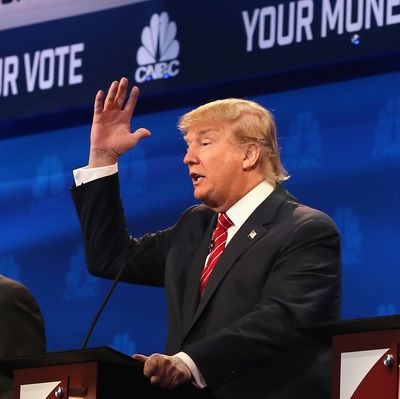
The unexpected rise of Donald Trump exposed divisions within the GOP, but their third presidential debate displayed a Republican party that is closing ranks. The dynamic was not immediately apparent; indeed, at first, the opposite appeared to be the case, when Ohio governor John Kasich launched a Huntsman-esque tirade against the fantasy plans circulated by Donald Trump and Ben Carson. But Kasich quickly faded from the scene and his positioning of himself as the champion of reality-based governance fell flat; indeed, judging the performance by body language alone, Kasich appeared to be the twitching neurotic, and his colleagues smooth and assured.
The general lack of disagreement between the candidates gave special drama to the one, largely content-free showdown between Rubio and Jeb Bush. In that set piece, Bush mustered all the feigned indignation he could to confront Rubio with his high number of missed Senate votes, a figure that is neither unusual for a senator running for president, nor has resulted in any noticeably different outcomes. Rubio dispatched Bush with a tone so understated, and almost pitying, it marked the instant and widely acknowledged death of Bush’s hopes. Rubio now inherits from the vanquished Bush the role of champion of Bushonomics and the general Bush strategy of combining folksy personal appeals, tiny dollops of policy for the working class, liberal instincts on immigration, and a fanatical devotion to the policy agenda of the party’s donor class. Rubio is more like George W. Bush than Jeb Bush ever was. By the time the campaign is over, not only will all of Jeb’s donors have defected to Rubio, Poppy Bush may be signing over Jeb’s share of the family inheritance to Rubio.
The debate allowed the candidates mostly to agree with each other and against the moderators, whom they especially resented for their intrusions of reality. A recurring trope was for candidates, when presented with uncomfortable facts, to simply deny them. (Becky Quick: “You’d have to cut — you’d have to cut government about 40 percent to make it work with a $1.1 trillion hole.” Ben Carson: “That’s not true.”)
Quick went on to quote Donald Trump calling Marco Rubio Mark Zuckerberg’s “personal senator,” a quote Trump denied so staunchly and convincingly that Quick apologized, despite being utterly correct. Later, John Harwood asked Rubio about the proportionately higher benefit his plan would give to the richest earners versus people in the middle. Harwood asked:
The Tax Foundation, which was alluded to earlier, scored your tax plan and concluded that you give nearly twice as much of a gain in after-tax income to the top one percent as to people in the middle of the income scale.
Since you’re the champion of Americans living paycheck-to-paycheck, don’t you have that backward?
This description is completely true. The Tax Foundation, a right-wing group, analyzed Rubio’s plan and found that the richest one percent would get an 11.5 percent increase in their after-tax income, as opposed to a 1.7 percent increase in after-tax income for taxpayers in the middle of the income distribution. Because it is a right-wing group, the Tax Foundation also prepared a “dynamic” analysis assuming the most fervent dreams of supply-side economics would hold true. That analysis — the numbers from which Harwood used, perhaps as a concession to Rubio, found that the middle would get a 15 percent increase in after-tax income, and the top one percent a 27.9 percent increase.
Rubio denied it flat-out. (“No, that’s — you’re wrong.”) First he answered by stating that his plan would give a bigger percentage increase in after-tax income for earners at the bottom — a different comparison from the one made by Harwood, who focused on the middle. Then he tried to say that his plan merely gave higher total dollar amounts to the rich because they earn more. (“Yeah, but that — because the math is, if you — 5 percent of a million is a lot more than 5 percent of a thousand. So yeah, someone who makes more money, numerically, it’s gonna be higher.”) Rubio was arguing that his plan merely gives higher dollar amounts of tax cuts to the rich because they pay more to begin with. But that was not Harwood’s claim. Harwood said the Tax Foundation found Rubio gave a proportionally higher cut to the richest earners than the middle-income earners, which is factually true.
This is the sort of exchange that will be replayed endlessly in the general election, since the entire Republican field is unified on the necessity of regressive, debt-financed tax cuts as the centerpiece of their economic strategy. Predictably, when the subject changed from revenue to outlay, the candidates’ moods shifted suddenly from the insouciant conviction that the budget can withstand the loss of trillions of dollars in revenue to rabid parsimony. All the retirement programs are going broke, in dire need of cutting — for younger people, not for current recipients! — and backed by worthless IOUs. Republicans agree that no connection can be made between the federal government’s revenue levels and the levels of social spending it can afford to maintain.
What the candidates agreed upon above all else is that any intrusions into their alternate reality represent a gross offense by the liberal media. Media-bashing provided the most popular subject for contemporaneous sermons, a foolproof way for candidates to bat down any inconvenient query and win wild applause from the partisan crowd. The currents of anti-Establishment rage that had seemed to roil the debate were, at least for one night, drowned out by satisfied unity.






























